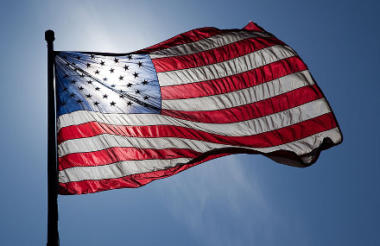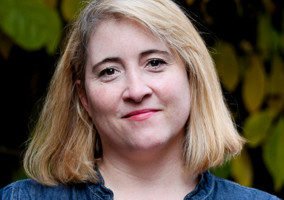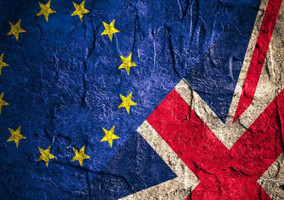Jay Kennedy reflects on the outcome of the US election and says that charities need to play a key role in healing the divisions that the campaign exposed.
Two steps forward, one step back.
That’s what I’m telling myself anyway about this recent period in American history and what seems to be happening across other liberal democracies like Britain.
It’s how I’m hoping not how I’m feeling, though. Like many other Americans (and I suppose unlike many others) I am depressed, confused, shocked, and angry about the election result.
I don’t agree with it, I am terrified and repulsed by it. I’m still struggling to reconcile myself to it.
I’ve been wrestling with how to explain it to my three daughters too – aged 11, nine and eight – who have dual nationality and American relatives (they’ve been worried they wouldn’t be able to visit their grandparents anymore). I tell them: “in a democracy, you have to live with the result even when your side doesn’t win and you don’t like what the other side says and does. But you still have rights. The winners don’t just get to take those away. And you will have the chance to change things by voting or even standing for office when you grow up.”
Different concepts or reality
I’ve lived and worked in the UK for fifteen years, and I consider myself as much a citizen of the UK as an American, in spirit anyway. I’m originally from the western state of Oregon. It votes ‘blue’, but as with the rest of the country the simplistic red state/blue state maps belie the full story.
The state is deeply divided culturally, politically and economically along urban and rural lines. It contains one of the most uber-liberal places in the US – Portland – which has some of the safest Democratic seats in the country.
In Portland you will find ultra-deep-green eco activists; a thriving, open gay scene; people debating anarcho-syndicalism in boutique cafes and brew pubs and on local radio.
But Oregon also is where some libertarian, gun-toting ranchers launched an armed occupation of the Malheur National Wildlife Refuge earlier this year, in the sparsely populated southeast of the state.
Demanding that the Federal government ‘give their land back’ for ranching rather than saving it for wildlife kind of missed the point that it was taken from local Native American tribes in the first place (but I digress). The occupiers view the use of this land as intrinsic to their culture, economy, and way of life, and see the Federal government as their oppressor.
My point here is there are almost two different concepts of reality (at least!) in one state. The pattern is replicated across the country.
Competing versions of society
This kind of thing may be hard for Europeans (and yes I include Brits in that) to grasp. The Trump phenomenon could be dismissed with “there go those crazy Americans again, what are they like, FFS!”, although Brexit and the rising nationalism across Europe make that less convenient.
Even though I and my family are repulsed by Trump (my Dad voted Democrat for the first time in his life), I can see where his support comes from. And I’m afraid it isn’t just explained by racism and sexism and bigotry, or “the backlash of old white guys”.
For me this is ultimately about competing versions of how ‘society’ or ‘the good life’ or ‘our culture’ or ‘America’ or ‘social progress’ are defined and understood. It’s about the People’s Republic of Portland and the Wild West Ranchers trying to figure out how to live together, and doing it badly.
Maybe that competition is implicit in the very idea of ‘society’. But I sense that right now rapid demographic change in particular is really ratcheting up the friction, not just in America but across Western democracies.
This shows up across multiple debates about immigration, language, religion, race, nationality (or ‘tribe’), sexuality and gender. Stuff that feels pretty fundamental to our existence as humans; to how we understand ourselves, and interpret the world and our place in it.
That is why the political conflict is so painful, and evokes so much emotion. Added to that, serial institutional crises and failures (especially the financial crash) have damaged our trust in collective, public institutions to fairly mediate. It’s an explosive mix.
What does this mean for charities?
But what does all this mean for charities, non-profits, and social action more generally?
The American and British (or European) circumstances are different, but broadly I think our responses need to be similar. After all, we share many political, legal and constitutional traditions. I think we need to focus on some inter-related efforts:
- We need to get organised to defend not just those groups who will be for whatever reason classed as ‘minorities’, ostracised, or threatened by the current mood, but more widely the rule of law, civil liberties, democratic values and institutions. Democracy can’t be a dictatorship of the majority.
- We need to educate. Our body politic is increasingly poisoned by media narratives that are overtly partisan and demonising. Social media is incredibly powerful but has increased the speed at which falsehoods can be spread and believed. We need to counter this by teaching our children (and our grownups) to think critically, challenge lies and shun crackpot conspiracy theories.
- We need to promote decency and respect. American elections are historically vitriolic, but clearly this one represented an abject failure on these counts, as has the Brexit fallout. We have to lead by example and promote respect between citizens, not trash-talk and abuse, even if our ‘leaders’ don’t.
- We need to create dialogue. This will be really hard. It feels increasingly in short supply. But charities, community groups and faith organisations can build the bridges. Without this we are just screaming at each other from our own echo chambers, as our social cohesion spirals down the drain.
- We need to show compassion, empathy and kindness. Not just with those on our own ‘side’, but with those whose views we may find contemptible (this is really tricky territory – can we show compassion and empathise with white supremacists? Should we, morally? What if it had the power to change their perception? What’s beyond the pale?).
The good news is, the voluntary sector is good at this stuff. Or it should be. Now is the time to show it.
Jay Kennedy is director of policy and research at the Directory of Social Change
Related articles











